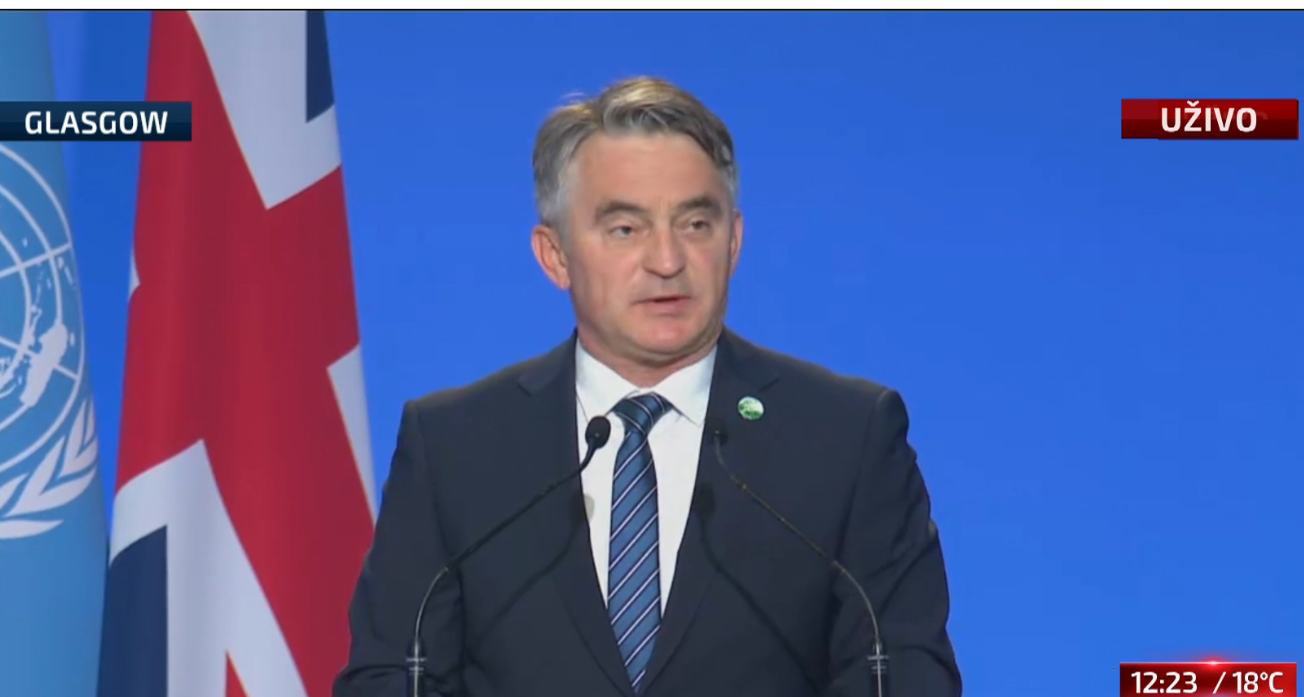Komsic at COP26: Bosnia needs financial assistance to achieve energy transition

Bosnia is fully committed to contributing to the fight against climate change but the energy transition process requires significant investments in low-carbon technologies and infrastructure, and BiH will need “significant international financial assistance and support” to achieve this goal, Bosnia’s Presidency Chairman, Zeljko Komsic, said at the 2021 United Nations Climate Change Conference (COP26).
Oglas
“The challenges are different for each of our countries, but regardless of that, it is necessary that we are on the same side in the fight against the climate crisis, and that we act together. Just as it is necessary to set realistic and achievable goals, because the implementation will require significant financial resources, especially in countries with lower GDP per capita, such as Bosnia and Herzegovina,” Komsic said.
He noted that Bosnia has confirmed its commitment to the Paris Climate Accords in April and was among the first in the Western Balkans to adopt its updated Nationally Determined Contributions (NDC) with a plan to reduce greenhouse gas emissions by 33.2 percent by 2030 and almost 66 percent by 2050.
“We are also working to enable the transition to sustainability and create an improved environment for attracting clean energy investments. We will need significant international assistance for technology transfer, the establishment of financial mechanisms to encourage decarbonisation, as well as financial support for projects related to climate issues,” he said.
He also pointed out that BiH signed the Sofia Declaration in November 2020 and undertook the obligation to work together with the EU toward turning Europe into a climate-neutral continent.
“Our plan in Bosnia and Herzegovina will define the goals for increasing energy efficiency measures, increasing the share of renewable energy sources and reducing greenhouse gas emissions by 2030, as well as the necessary policies and measures for their realization. The goal is to set ambitious goals for each of the dimensions of the Plan, which we believe could realistically be achieved by 2030, and which will enable further development of the energy sector of Bosnia and Herzegovina,” he said.
Komsic stressed that it is important for Bosnia and Herzegovina to define ways of financing the energy transition.
“The energy transition will require significant investments in low-carbon technologies and infrastructure. In this regard, Bosnia and Herzegovina, like other countries, will need significant international financial assistance and support for the decarbonisation of the energy sector by 2050, with a special focus on the planned closure of coal mines and the shutdown of coal-fired power plants,” he said.
“There is no doubt that Bosnia and Herzegovina wants to contribute to the fight against climate change, but we will not be able to do it alone, we will need support and cooperation with countries that can accelerate this process with their knowledge and resources. And regardless of the fact that I do not represent a country with such a large number of inhabitants, in an effort to stop climate change, it will be necessary for everyone to give their contribution, and you can count on us regarding this,” he concluded.
Kakvo je tvoje mišljenje o ovome?
Učestvuj u diskusiji ili pročitaj komentare
Oglas
Kakvo je tvoje mišljenje o ovome?
Učestvuj u diskusiji ili pročitaj komentare
Oglas





 Srbija
Srbija
 Hrvatska
Hrvatska
 Slovenija
Slovenija



























































